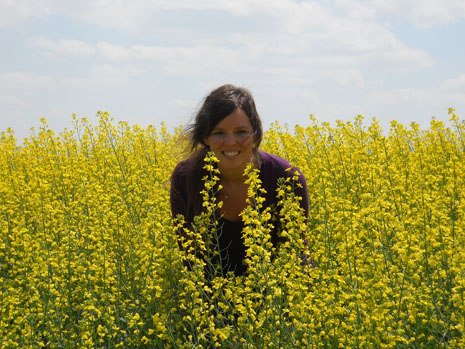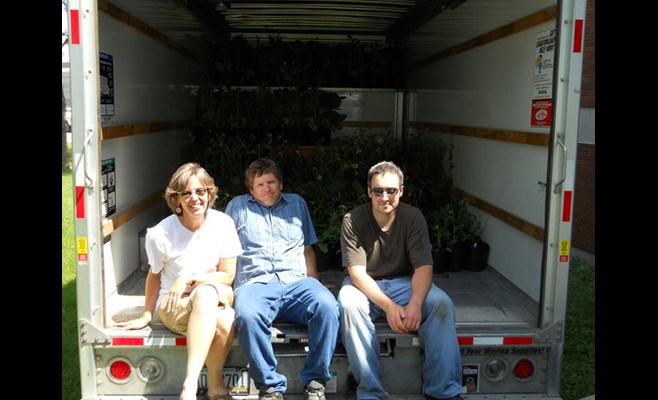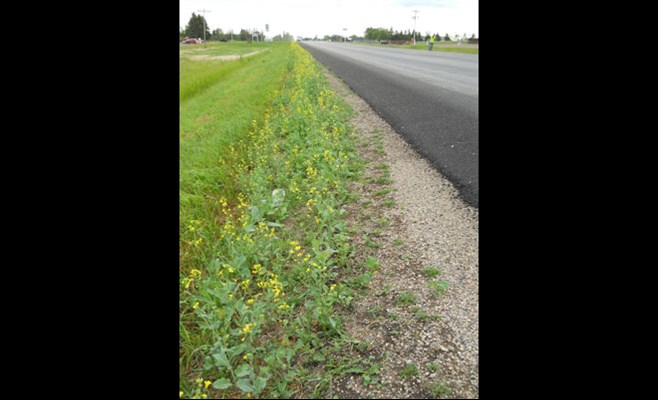First Wild Canola Plants With Modified Genes Found in United States

University of Arkansas graduate student Meredith G. Schafer and her colleagues have found genetically modified canola in wild populations in the United States.
"Scientists at the University of Arkansas and their colleagues have found populations of wild plants with genes from genetically modified canola in the United States.
Globally, canola can interbreed with 40 different weed species, and 25 percent of those weeds can be found in the United States. These findings raise questions about the regulation of herbicide resistant weeds and about how these plants might compete with others in the wild.
Graduate student Meredith Schafer will present the group's findings Friday, Aug. 6, at the Ecological Society of America meeting in Pittsburgh, Pa.
"We really don't know what the consequences of the gene escape " said Schafer. "We don't know what these plants are going to do."
The research originated when Schafer and Cynthia Sagers, professor of biological sciences at the University of Arkansas, spotted some pretty yellow flowers in a ditch near Warehouse Foods in Langdon, N.D. As part of another research project, they had some portable strips that test for genetically modified proteins found in canola, proteins that convey herbicide resistance to crop plants. The strips work much like those in a pregnancy test; Schafer and Sagers crushed plant leaves in water and added the test strip, which would develop one line if it tested negative for the modified gene and two lines if it tested positive for a modified protein. Their test strips could detect the protein that conveys Roundup resistance; they also could detect the protein that conveys resistance to Liberty Link, another herbicide used on canola.
Schafer and Sagers determined at once that the parking lot weeds contained transgenic genes.
"Immediately we knew we needed to investigate it further," Sagers said.
They filled a car with test strips and set out on a road trip in a red Ford Explorer, traveling on highways east and west across North Dakota, stopping every five miles on the highways to look for roadside weeds. They counted canola plants in a 50-meter transect, photographed the locations, took GPS statistics, took a plant sample, and tested the samples in the front seat. They then collected and pressed the sampled plant and drove to the next location.
"We traveled over 3,000 miles to complete the sampling," Schafer said. Some of the sites had densely packed plants, with 1,000 specimens in a 50-meter space. They spray these roadsides with herbicides, and canola is the only thing still growing.
They found wild canola in about 46 percent of the sites along the highway, either growing on the side of the road or in cracks in the highway. About 83 percent of the weedy canola they tested contained transgenic material, that is, they contained herbicide resistance genes from genetically modified canola. Further, some of the plants contained resistance to both herbicides, a combination of transgenic traits that had not been developed in canola crops.
"That's not commercially available. That has to be happening in the wild," Schafer said. "That leads us to believe that these wild populations have become established populations. Technically, these plants are not supposed to be able to compete in the wild."
Current farming practices may quickly make the problem worse. Each year tens of thousands of acres of canola go un-harvested in the field. As a consequence, an enormous reservoir of seed is created, which can then spread into wild populations.
"Once this happens, it would be difficult to get rid of these weeds using current herbicides," Sagers said.
While the problem looms large in North Dakota, Sagers says the message is a global one. The world recently hit a milestone, where more than 50 percent of the earth is covered in crops used for food or forage. Domesticated plants have wild cousins that often are considered weeds, and sometimes these plants can still cross breed, creating a high potential for herbicide and pesticide resistance to show up where it isn't wanted.
"Things can escape from cultivation, and we need to be careful about what we stick into plants," Sagers said.
In addition to Schafer and Sagers, researchers on the project included postdoctoral researchers Jason P. Londo at the University of Arkansas; Andrew X. Ross and Steven E. Travers from North Dakota State University; Peter K. van de Water of California State University in Fresno, Calif.; and Connie A. Burdick and E. Henry Lee of the U.S. Environmental Protection Agency.
Topics
Contacts
Meredith G. Schafer, biological sciences
J. William Fulbright College of Arts and Sciences
501-952-3643,
mschafe@uark.edu
Cynthia L. Sagers, professor, biological sciences
J. William Fulbright College of Arts and Sciences
703-292-8712,
csagers@nsf.gov
Barbara Jaquish, science and research communications officer
University Relations
479-575-2683,
jaquish@uark.edu
Headlines
Affairs of the Heart
Find out how biomedical engineering professor Morten Jensen is developing innovative devices to produce better outcomes in cardiovascular medicine.
Students, Faculty and Alumni Kick Off Centennial Year of School of Law
Founded April 14, 1924, the School of Law faculty, students and alumni started the celebration of its centennial year with a Founders Day event and will continue with more commemorative events this coming fall.
Yearly Academic Award Winners, Ambassadors Recognized by Bumpers College
Schyler Angell, Lexi Dilbeck, Cason Frisby, Tanner Austin King, Anna Brooke Mathis, Carrie Ortel, Lucy Scholma, Kadence Trosper and student ambassadors were honored at the college's annual reception.
World Premiere of 'Cries from the Cotton Field' Slated for May 8
Cries from the Cotton Field chronicles the journey of 19th century Italian immigrants from northern Italy to the Arkansas Delta and ultimately to Tontitown. It will premier at 6 p.m. May 8 in Springdale Har-Ber High School.
Fay Jones School's Earth Day Event Spotlights Sustainable Materials and Projects
"One day doesn't seem like a lot, but one day can empower individuals and groups, energize them to work for change and innovate for transformative solutions," professor Jennifer Webb said of the students' design work.








